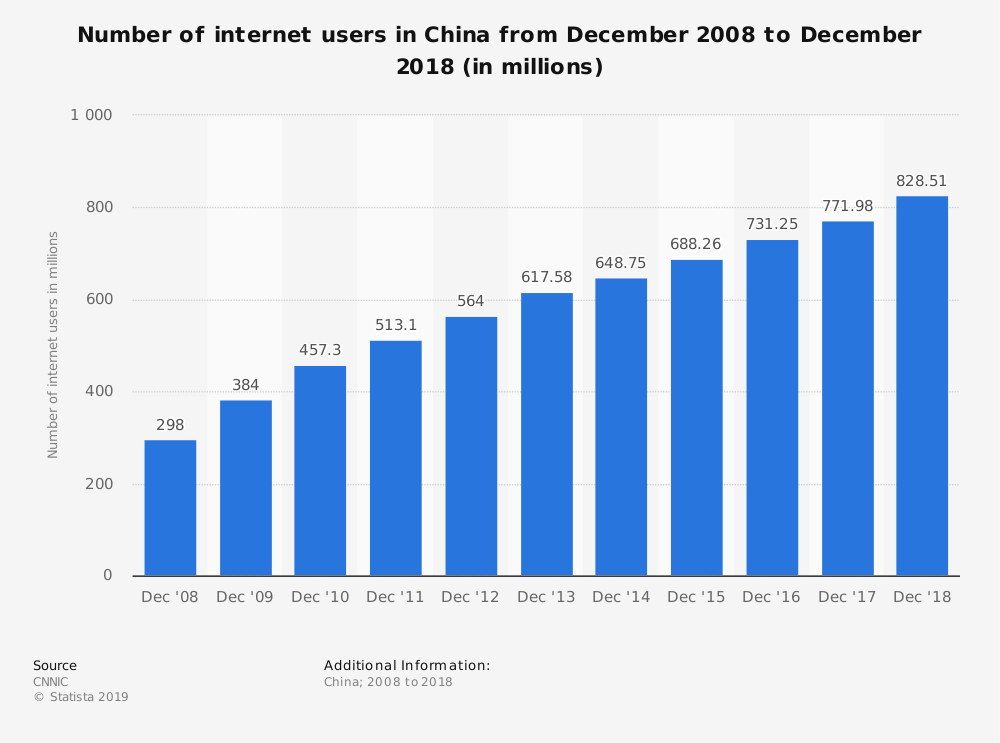Video Hosting in China: What You Need to Know in 2025
Over the past ten years, the number of people accessing the Internet in China has increased fivefold. At the beginning of 2024, China had 1.09 billion Internet users, and this number is continuing to grow steadily. This widespread Internet access allows China’s citizens to consume content in different ways, mainly through video streaming platforms.
As you might expect, this rapid growth and new type of entertainment led to an explosion of Chinese streaming platforms and online video hosting in China. By June 2024, 1.068 billion Chinese viewers watched videos online using Chinese streaming platforms, a steep jump from the 927 million viewers who watched videos online in December 2020. With China’s 1.417 billion residents, this number has the potential to continue to grow.
Yet, other than for Chinese streaming platforms, China remains an out-of-reach market for many businesses that create and publish video content. Even in 2025, most video platforms, including many Chinese streaming platforms, cannot stream content to Chinese audiences from within the People’s Republic of China (PRC).
In this article, we’ll examine the problems of video hosting in China. First, we’ll discuss why breaking into the Chinese market is essential for the growth of any business. Then, we’ll review some challenges for foreign companies seeking video hosting in China and discuss options for streaming hosting providers not blocked in China.
This post has been updated to reflect the most accurate information about Chinese video hosting and streaming platforms available as of April 2025.
Table of Contents
- What’s the Value of Video Hosting in China?
- What Do Chinese Audiences Want
- The 3 Challenges to Chinese Video Hosting
- Bypassing the Great Firewall with an ICP License
- External Video Hosting Sites Not Blocked in China
- Why Use Dacast for Video Hosting in China
- Emerging Trends in Chinese Video Hosting for 2025
- FAQs
- Conclusion
What’s the Value of Video Hosting in China?

China’s population is nearly 1.4 billion, which is considered the world’s largest economy today. Its booming economy has led to a massive tech sector and tremendous growth in online video. That is why there is such a gigantic potential for China video streaming.
If we look at the numbers only, more people watch online short videos made in China using Chinese streaming platforms than the entire population of the United States by a fair margin. Tencent Video, one of the largest online video platforms among all Chinese streaming platforms, has more than 435 million monthly active users. Kuaishou, a short video platform, had about 714 million monthly active users in the third quarter of 2024.
The video streaming market in China is experiencing exponential growth, and we can expect it to reach a worth of $115.3 billion between 2024 and 2028.
Understanding the Chinese Audience
On top of that, the audience in China is relatively young, which projects well for future growth. For example, over half of online video viewers using these Chinese streaming platforms are in their teens and 20s.
That also explains the success of the Chinese tech giant Baidu for example. It ranked among the top Chinese streaming services and has been dubbed the “Netflix of China” due to its popularity among Chinese consumers.

Countless non-China businesses have good reason to invest in videos for Chinese audiences and break the monopoly of Chinese streaming platforms. In particular, there is a massive market for online video platforms, OTT, and entertainment. Ecommerce isn’t far behind as well. In fact, China is the biggest market in the world for ecommerce sites that want to tap into live streaming video shopping.
The Potential of Sporting Content
Sports are huge in China, and Chinese streaming services allow sporting organizations to expand their reach. Currently, the two most popular sports in China are basketball and soccer, respectively.
Many Chinese fans are passionate about the NBA. That’s why the NBA jumped at the opportunity to partner with Chinese video platform Tencent to offer game coverage all over China. Using Tencent’s vast reach and video infrastructure, the NBA tapped into China’s highly engaged sports fan base.
The partnership allowed the NBA to present live games, highlights, and short video content, increasing the league’s popularity among Chinese viewers. Considering 490 million Chinese fans tuned in to watch last season’s games, the partnership will also continue for the ‘24-’25 season of the NBA.
Increasing Interest In Educational Video Content
Educational content also presents an opportunity for a large audience in China since higher education institutions are increasingly offering their courses internationally. Often, these online courses exist as a complete overseas program.
You must deliver a high-quality viewing experience if you have people paying to access your content. For that, you need delivery inside mainland China. Plus, you can share tons of educational content outside of higher educational institutions on online video platforms with a Chinese audience.
This content is also a prime candidate to be shared on a short video platform of your choice or via short video apps such as how to cook different dishes, set up a computer program, or do woodworking.
Business and Employee Training
If you’re not in the Chinese e-learning sector, you may sell products or services or partner with Chinese businesses. Nowadays, many companies want to deliver employee or agent training to their operations in China. We’ve also seen many companies using video and live streaming to market to consumers in China.
For these reasons, video delivery and hosting in China are essential to many businesses. This applies to both on-demand videos and live streaming. However, delivering video content to viewers in China presents several challenges.
What Do Chinese Audiences Want
The Chinese audience is relatively young, which projects well for future growth. For example, over half of online video viewers using these Chinese streaming platforms are in their teens and 20s.
This also explains the success of the Chinese tech giant Baidu. Due to its popularity among Chinese consumers, Baidu is ranked among the top Chinese streaming services and is known as the “Netflix of China.” Despite the Great Firewall, China’s internet users continue to climb yearly, and they have very specific tastes when it comes to consuming video content. Their preferences include:
- Short Videos: Short-form videos are immensely popular with Chinese Audiences, especially the younger demographic. Platforms like Douyin (the Chinese version of TikTok) and Kuaishou cater to users who favor quick, digestible content under 1-2 minutes.
- Live Streaming: It’s commonly used for entertainment, e-commerce (live-streaming shopping), and even education. Streamers often engage with audiences in real-time, making it a more interactive and immersive experience.
- Dubbed over Subbed Content: Mandarin is the main language in China, and audiences prefer to consume dubbed and localized content. While dubbed content is more popular, some consider subtitles a better option for more serious or nuanced content.
When it comes to the subject of the content they’re consuming, Chinese audiences want media that respects authority and tradition. Chinese society values respect for authority, family, and social harmony. Content that promotes individualism over collective values or portrays disrespect for authority may not resonate well.
Also, portraying beauty standards, fashion, or modern urban culture should match Chinese aesthetic preferences. Don’t show excessive wealth or over-consumerism, especially in the context of social media influencers, to avoid backlash over materialism.
Countless non-China businesses have good reason to invest in videos for Chinese audiences and break the monopoly of Chinese streaming platforms. In particular, there is a massive market for online video platforms, OTT, and entertainment.
E-commerce isn’t far behind as well. In fact, China is the biggest market in the world for e-commerce sites that want to tap into live-streaming video shopping.
The 3 Challenges to Video Hosting in China

Foreign companies face several challenges when streaming live video into China. The greatest challenge is the Great Firewall, the sole purpose of which is blocking free access to certain foreign websites in China. The Chinese government’s censorship system controls it, which makes it difficult for people in China to stream unapproved content through any video hosting service.
It also slows down Internet speeds, so broadcasters must fight against slow speeds and high bandwidth costs when streaming to China.
Let’s look at three such challenges in a bit more detail.
1. Great Firewall and Content Restrictions
The Great Firewall restricts many professional online video hosting solutions from operating in China today. In essence, the Great Firewall refers to China’s internet censorship system. It blocks access to many international websites, apps, social media platforms, and other online resources deemed inappropriate or offensive by authorities.
Its official name is the Golden Shield Project, and it was put into place in 1998. Its main purpose is to monitor incoming online traffic into China and control what makes it through. This is the main reason why all external video content sent to China is heavily monitored.
It ensures all video and user-generated content complies with China’s strict rules regarding what it finds acceptable. For example, China blocks popular Western video platforms such as YouTube, Facebook, and Vimeo because their user-generated content is hard to regulate and censor. Also, foreign users inside China are blocked from live streaming completely.
To get around the Great Firewall and China’s rigorous content restrictions, you must work with domestic video platforms or set up your own video hosting services with physical infrastructure in China. That allows you to reach the Chinese market and share your desired content with your Chinese audience. Alternatively, you’d have to choose a video hosting platform like Dacast that enables you to live stream and serve on-demand videos within China, thanks to its ICP license.
2. Slow Speeds

Many broadcasters find that even when content delivery networks (CDNs) stream video to China from outside the mainland, the speed and quality could be better and more consistent. This is mostly due to the restraints posed by the Great Firewall. One of its purposes is to inspect and filter traffic, which adds a delay and can disrupt the data flow.
This is a challenge that faces all external streaming platforms ranging from the largest online video platforms to live streaming platforms and even short video platforms.
CDNs reduce loading and buffering by caching content at the server closest to the viewer. That ensures that all video streaming is done from a server near viewers anywhere in the world. The server used to provide the content depends on what type of “points of presence” (POPs) are near the viewer.
For a Chinese viewer, content is often streamed from as far away as Seattle, which leads to significant speed and latency problems. In addition, the longer a video travels to reach the viewer, the more the speed and viewing quality are impacted.
The further you are from the server, the more intermediary points the request and the response have to go through to reach the viewer. So, no matter how fast your ISP advertises your connection speed, these issues still need to be solved.
If it takes a second or more to make a request and receive a response, the likelihood is that your viewers don’t have a great experience.
To provide an excellent viewing experience, you must cut the distance between where you’re hosting the video and where your viewers are. For example, fast and consistent content delivery to China means using a hosting service in the country, not thousands of miles away.
That’s why choosing a live-streaming service or CDN with its servers within China is critical. It minimizes the distance between the CDN and the viewers and reduces the lag.
3. Bandwidth Costs
China’s technical restrictions mean its bandwidth can sometimes be 50 times more expensive than in Western countries. Unfortunately, that means that video streaming costs your viewers more money.
Broadcast costs have been amortized over decades in the US but are being built rapidly from scratch in China, leading to higher user prices. These high bandwidth costs affect foreign content providers looking to enter the market, as well as local Chinese content creators.
Higher costs can affect profit margins, especially for small businesses or independent creators. So, if you have a low budget, then you might find it difficult to launch a live-streaming business or VOD platform in China.
Troubleshooting Common Challenges
Due to the above-mentioned challenges, providers sometimes face difficulties hosting video content in China. Common issues like slow buffering and poor video quality can disrupt content delivery and lower audience enjoyment. Here are a few troubleshooting solutions:
- Slow Buffering: The usual cause is using servers far from the viewer. To solve this, use a CDN with servers located within China to minimize the distance between your content and the audience.
- Codec and Low Resolution: Use the H.264 codec, which most streaming platforms in China support. Consider encoding videos at 720p or lower, as higher resolutions lead to longer load times and higher bandwidth consumption.
- Lower Bitrates: Chinese internet speeds are slower, so lower bit rates will reduce buffering and improve playback stability. Use adaptive bitrate streaming so the video can adjust to the viewer’s connection speed in real-time.
Bypassing the Great Firewall with an ICP License

However, even with all those regulations, there is a way to broadcast and stream in China. There are a few main ways to deliver your video in China, and they all involve obtaining an ICP license to access China’s live-streaming market.
Dacast is one of those companies that provides fast delivery of online video content through the great firewall because it has multiple points of presence (PoPs) across the mainland and a partnership with China-based CDN services. Most of all, it has that all-important ICP license.
What’s an ICP License?
An ICP license—short for an “Internet Content Provider” license—is a special permit granted by the Chinese government so that the Great Firewall doesn’t block your website. These permits are issued by the Chinese Ministry of Industry and Information Technology. There are two types of licenses you can get:
- ICP Filing: A basic registration that is necessary for websites offering non-commercial content. It’s often used by individuals or businesses providing information, blogs, or other non-commercial content to the public.
- ICP Commeoffersse: This is needed if the website offers commercial services, such as e-commerce, advertising, or other for-profit activities.
How to gain your ICP License?
In practice, establishing a presence in China requires working with a local partner video platform to help you obtain the necessary ICP license. Unfortunately, this process can be unpredictable and lengthy.
It used to require frequent travel to China and multiple meetings with local partners and government officials. Admittedly, this process has become smoother in recent years, and meetings can occur virtually. Still, the current diplomatic tensions between the US and the PRC could change that, requiring a significant investment of time and resources.
The approval of your ICP commercial license can take anywhere from a few weeks to a few months. The license is also valid for 5 years and subject to annual inspections. After that period is up, you’ll need to repeat the process. On the other hand, approval for an ICP Filing usually takes up to 30 days, but the validity is unlimited.
Here is a simple step-by-step explanation of the license-acquiring process:
- Assess Your License Requirements: Consult a legal expert specializing in Chinese internet regulations to help determine what type of license you should apply for. To do this, you must collaborate with a China-based partner, such as a hosting company, cloud provider, or video platform.
- Choose a Hosting Provider in China: You must work with a Chinese ISP or cloud hosting provider that offers hosting within China to help you register your domain and facilitate the ICP application. The server hosting your content must be within China.
- Prepare the Necessary Documentation: Provide proof of your business registration in your home country. Designate an authorized representative for your application, typically a company executive or an employee with legal authority. Your China-based partner will also need to provide extensive documentation.
- Submit Your Application: In most cases, you must submit the application through the MIIT’s online system, with your local partner helping you submit documents on your behalf. Remember that foreign entities cannot directly apply for this license.
- Wait for the Approval: Depending on the type of license you want, the approval process can take several months. It involves government scrutiny of your site’s content and purpose. To maintain a commercial ICP license, you must undergo annual inspections in Porter.
- Display Your ICP License: Once approved, your website or platform must prominently display the ICP license number in the footer. The license number proves that your site complies with Chinese regulations.
Still, these conditions are always subject to change, so it’s important to stay updated and consult with a local legal expert.
Staying Compliant With Chinese Online Regulations
China has some of the strictest regulations regarding foreign internet content. Even the smallest infringement can result in a license suspension and the blocking of a website or platform. To avoid this, you must:
- Consistently Monitor Your Content: This includes filtering out political content, sensitive social issues, or foreign content that might conflict with censorship rules.
- Comply with Data Privacy and User Information Regulations: Follow the PIPL and other laws governing user data. Avoid collecting or storing personal data unless absolutely necessary, and secure proper user consent.
- Review Content Moderation Policies: Have processes for removing harmful or illegal foreign and domestic content, such as hate speech and unlicensed media.
- Partner with Compliance Experts: Work with local Chinese legal experts or compliance consultants who understand the nuances of Chinese Internet laws.
The last point may be the most important, as rules and regulations are constantly changing and becoming more stringent. In 2025, the Chinese government cracked down on Cybersecurity Law and Data Security Law enforcement, insisting that businesses must store data from Chinese users on servers in China.
Failure to do any of the above will lead to heavy fines, interruptions in service, and, in extreme cases, the retraction of your license.
External Video Hosting Sites Not Blocked in China
If you’re not ready to negotiate with local officials, you can always partner with a multi-CDN provider and get your own ICP license. If you don’t get one within the grace period offered to you, Chinese internet service providers (ISPs) can block your website. But if you don’t want to go through the hassle of getting the ICP license, you can choose an online video platform that has already done this.
As of February 2024, only these three options have gained the appropriate clearance from the Chinese government. The online video platforms that have China video hosting capabilities include:
- Dacast ICP License 19031887
- IBM Cloud Video
- Panopto
- Wowza
Here is a quick comparison of all the platforms with permission for video hosting in China:
| Feature | Dacast | IBM Cloud Video | Panopto | Wowza |
| ICP License Availability | Yes | Yes | Yes | Yes |
| Local POPs in China | Yes | Yes | Limited | Yes |
| Bandwidth Costs | Competitive | Higher | Higher | Higher |
| Live Streaming Support | Yes | Yes | Limited | Yes |
| VOD Hosting | Yes | Yes | Yes | Yes |
| Content Delivery Network | China-specific CDN | China-specific CDN | Limited | China-specific CDN |
| Compliance Support | High | Moderate | Moderate | High |
| Video Monetization Options | Yes | Limited | No | Yes |
| Ease of Setup | Simple | Moderate | Complex | Moderate |
| Customer Support | 24/7 Multilingual | Limited | Limited | 24/7 support |
| Unique Features | Advanced security (AES encryption, DRM) | Enterprise-grade cloud services | E-learning-focused tools | Real-time streaming, low-latency, flexible API |
External Platforms that DO NOT Offer China Delivery
Some of the top streaming platforms on the market that do not have the appropriate clearance for China video hosting include:
- Brightcove
- Vimeo
- Streamshark
- Kaltura
- JW Player
- Muvi
- StreamShark
Chinese Video Hosting Platforms
As we mentioned, the video hosting business in China is rapidly growing, so it’s no surprise that the country has several local hosting providers. Because they operate fully within the scope of China’s strict regulations, they often provide faster content specific to the region.
Most Chinese platforms also have WeChat integration, which allows users to interact easily with other viewers. This feature makes it possible to share and comment on content, as well as discuss it at length with other WeChat users.
These platforms often feature strong community-driven elements, such as live streaming with fan interactions, user-generated content, and donations or gifts for streamers. They use advanced analytics to personalize content recommendations, further improving user engagement. Some of the most popular platforms are:
- Tencent Video (known as WeTV outside China)
- YouKu
- Bilibili
- iQiyi
- Kuaishou
| Platform/Feature | Tencent Video | YouKu | Bilibili | iQiyi | Kuaishou |
| Founded | 2011 | 2006 | 2009 | 2010 | 2011 |
| Ownership | Tencent | Alibaba Group | Bilibili Inc. | Baidu | Kuaishou Technology |
| Content Type | TV shows, movies, live-streaming, sports | Movies, TV shows, variety shows, user-generated content | Anime, gaming, user-generated videos, e-sports | Movies, TV shows, original series, live-streaming | Short videos, live-streaming, user-generated content |
| Subscription | VIP Membership (ad-free, exclusive content) | Premium Membership (ad-free, additional content) | Bilibili Membership (exclusive perks, VIP access) | iQiyi VIP (ad-free, exclusive content) | Kuaishou VIP (premium features, ad-free) |
| Free Version | Yes (with ads) | Yes (with ads) | Yes (with ads) | Yes (with ads) | Yes (with ads) |
| Pricing | N/A | $5.99 (monthly) | $47.99 (annual) | $119.99 (annual) | N/A |
| Live Streaming | Yes (sports, events, variety shows) | Yes (events, variety shows) | Yes (gaming, e-sports) | Yes (movies, TV shows, events) | Yes (short videos, live streaming) |
| Monetization | Ads, subscriptions, in-app purchases | Ads, subscriptions | Ads, subscriptions, donations (for streamers) | Ads, subscriptions, in-app purchases | Ads, in-app purchases, gifts (for streamers) |
| Content Regulation | Strict censorship, localized content | Strict censorship, localized content | Strict censorship, localized content | Strict censorship, localized content | Strict censorship, localized content |
What To Look For in A Hosting Provider
Now that you know which foreign and domestic video hosting providers are available in China, how do you pick the right one for your business requirements? Well, they need the proper infrastructure and a few basic features to provide uninterrupted video content. Here is our checklist of things to look for in platforms that offer video hosting in China:
- ICP License Support: The provider can assist in securing the mandatory ICP license for hosting in China.
- Data Center Location and Compliance: Its data centers are located in China and compliant with local certifications and regulations.
- Direct Connectivity and Low Latency: It offers direct peering with Chinese ISPs and low-latency routing for fast website performance within China.
- China-Specific CDN Support: It can provide access to or compatibility with CDNs optimized for China to enhance content delivery speed and reduce load times.
- Network Security and DDoS Protection: It has a robust firewall, DDoS protection, and encryption capabilities tailored to China’s cybersecurity landscape.
- Compliance with Content Censorship: The provider must always adhere to China’s content censorship requirements and support the necessary content filtering.
- Local Technical Support: It has Chinese-speaking support teams who understand local regulations and can provide timely assistance.
- Disaster Recovery and Redundancy: It has strong disaster recovery plans and multiple data centers in China to ensure business continuity and service uptime.
- Legal and Regulatory Compliance: It’s always in compliance with China’s data sovereignty and cybersecurity laws, including handling data storage and transfers.
- Scalability and Future-Proofing: The provider’s infrastructure can scale with your growth and adapt to changes in China’s regulatory landscape.
Why Use Dacast for Video Hosting in China

When it comes to finding a reliable VOD video hosting platform in China, Dacast is one of the best choices. It’s on the list of very few online streaming platforms that support private video hosting in China. That alone makes it one of the best Chinese streaming services you can work with.
We have already been through the complicated process of gaining approval to deliver content in China, and we have an ICP license from the Chinese government. We’ve also set up local PoPs and have propagated their connectivity.
It’s important to note that not all “global” video streaming CDNs are registered and can deliver content in mainland China. Truly global CDN providers, like Dacast, can deliver content beyond the Great Firewall and anywhere in the world.
The good news? Dacast customers can deliver the same high-quality viewing experience to their Chinese viewers as they do to their audiences in other parts of the world. In addition, Dacast can provide you with the ability to offer both videos-on-demand and live-streamed content to China.
With access to over 60,000 servers across China, we can deliver high-quality video content even to those located away from the populous Eastern seaboard.
Dacast can support both on-demand and live-streaming content in China, so we have you covered no matter how you want to connect with your Chinese audience. As you can see, Dacast clearly stands above other providers, especially for business use. Some of the features that make Dacast stand out include:
- Existing ICP License: Dacast already has an ICP license for video hosting and streaming in China, simplifying the bureaucratic process of acquiring permission.
- Established Infrastructure: Dacast guarantees minimal latency and reliable delivery thanks to over 60,000 servers and multiple POPs in China.
- Advanced Features: It has tools like AES encryption, DRM, and a bulk uploader, making it ideal for businesses with high security or content management needs.
- Customer Support: It provides users with 24/7 multilingual support for troubleshooting and guidance.
- Cost Efficiency: It offers much more competitive pricing for bandwidth and hosting services compared to IBM Cloud Video or Panopto.
Emerging Trends in Chinese Video Hosting for 2025
China is aware of its potential in the video hosting sphere, so it’s constantly pushing for innovation and improvement on that front. Surprisingly, it’s also one of the biggest supporters of AI development, considering its strict censorship laws and traditional values.
Most Chinese video hosting providers use AI to optimize content delivery. AI algorithms can personalize content recommendations and improve user engagement with more targeted video experiences. Additionally, these tools can also help improve video compression, reducing bandwidth requirements for smoother playback even in areas with lower internet speeds.
Another new technology that China is embracing freely is 5G. In fact, it’s trying to establish a functional nationwide 5G network as soon as possible. With the accelerated adoption of 5G, live streaming in China will become more reliable. We can expect lower latency rates and faster download speeds, making it possible to do high-quality broadcasts even in remote regions.
FAQs
1. What streaming platforms are used in China?
China has its own booming video hosting market, with several well-established and beloved providers. The most commonly used Chinese video hosting alternatives for live streaming and VOD include:
- Tencent Video
- Bilibili
- iQiyi
- Kuaishou
- YouKu
- Douyin Livestreaming
- RED (Xiaohongshu)
- Taobao Live
- Yizhibo
- Huya
2. Which video hosting website is based in China?
There are several video hosting websites based in China that you can use to reach the country’s audience. Some of those platforms include Dacast, Tencent Video (sometimes known as QQ Video), Youku, IBM Cloud Video, and more. iQiyi is another popular video-hosting website in China, often compared to Netflix.
3. What is the most popular video site in China?
Currently, the most widely used video site in China is Tencent Video. It has 435 million monthly active users and around 117 million users that pay to use the service. Part of its success is because it’s closely related to WeChat, a type of social media platform in China.
4. What do Chinese use instead of YouTube?
Sites that primarily host user-generated content, like YouTube and Vimeo, are banned in China. Instead, Chinese audiences use Youku, which many consider the Chinese YouTube equivalent. It has a user base of over 500 million monthly active users, and the videos on the site generate over 800 million daily views. This service is owned by Alibaba and offers a great place to share your video content with your target audience in China.
5. How do I share a video with someone in China?
To share a video with someone in China, you’d have to use a platform like Youku. However, if you want to share the video with a limited number of people, you can use a service like FileCloud. And for enterprise-level video content sharing, it’s best to use a service like Dacast that can deliver the video securely within China.
Conclusion
Video hosting in China can be incredibly beneficial for your business and revenue, especially if you’re trying to reach viewers within the Great Firewall. With the potential problems with non-China hosting, it’s good to know there are viable ways of streaming and broadcasting your video content in mainland China.
As one of the rare platforms that provides video hosting in China, Dacast offers advanced features for publishers or businesses focused on video hosting more than live streaming. These features include AES encryption, an advanced bulk uploader with Dropbox integration, and a super-easy video management system.
Try these features risk-free in our 14-day free trial. All you have to do is sign up today to get started. Just click the link below to get free streaming for a full two weeks (no credit card required).
Finally, if you have further questions or thoughts, feel free to leave us a comment below. Are you looking for more live streaming tips, industry networking opportunities, and exclusive offers? If so, you can also join our LinkedIn group.
Thanks for reading, and happy broadcasting!
 Stream
Stream Connect
Connect Manage
Manage Measure
Measure Events
Events Business
Business Organizations
Organizations Entertainment and Media
Entertainment and Media API
API Tools
Tools Learning Center
Learning Center Support
Support Support Articles
Support Articles